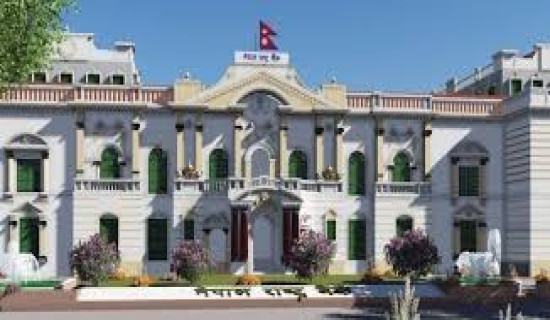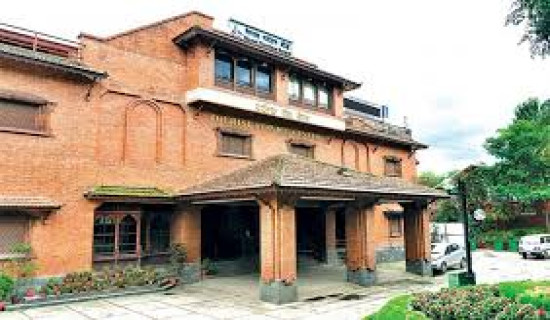- Tuesday, 17 February 2026
Nepal's Foreign Policy Navigating Geo-strategic Manoeuvres
Nepal is centrally located at the crossroads between India’s adoption of the adversarial nature of politics of the West and China’s Confucian harmony of politics. Despite incompatible polities, they have parallel ambition to achieve a great power status and restore past imperial glories. The dissimilar means-- democracy and meritocracy-- adopted by them requires Nepal to acquire capacity to navigate its foreign policy in all the situations they unfold-cooperation, competition and conflict of interests, ideologies, images and strategies to fit self in the shifting dynamics of world politics.
The separate ambition and clashing interests in Asia are getting pivotal attention. Nepal needs to educate the public for the utility of adopting national, regional and global optimum.
In a world of interconnections, even small states acting in concert can promote their public and national interests which they cannot achieve alone. Now Nepal’s worldview is derived from the “multipolar moment,” a shift away from the unipolar moment of the world.
Cautious balance
The global alliance pattern is based on status, not negotiated social contract, based on the responsibility of relative power potential. Nepal, therefore, needs to remain cautious to the emergence of diverse powers and navigate an array of clashing frames of Asian geopolitics and their ties with the Atlantic nations. The politicisation of development cooperation is exerting pressure on the alignment of geopolitics and geo-economics with the proliferation of rival security, infrastructure, economic and political institutions. Cautious balancing of its ties with them can return a hope for diversification of international relations.
It is, therefore, useful to frame pertinent questions: Is Nepali epistemic community producing ample knowledge about the mega trends of geopolitical shift to Asia which are useful for its foreign policy planning and execution and escape from its vortex? Are Nepali political leaders able to think outside their partisan box and elevate their standpoint to national scale so that the nation’s foreign policy can acquire coherence, consensus and efficacy in empowering the people and state institutions? Does its multiplatform approach to international relations ensure mutual coexistence or should it be confined to only the triangle shaped by India, China and the USA?
Its political history reveals that Nepal’s geopolitical strength had waxed and waned based on leadership dexterity in statecraft. The external conditions for Nepal remained critical as imperial exercise of power witnessed frequent regime change through proxies thus deflating the nation’s right to self-determination. Nepal’s overall foreign policy patterns so far hovered around homophily, the notion that democratic nations flock together for a common cause and orient their economies to a market oriented dependent model. The West and India tend to lure Nepal to look like them in terms of common democratic values, institutions, policies and political processes.
Its worldview consorts these values although Nepal in the past sought to balance their predominance by means of opening to the diverse scales and ideologies of states - China, Russia, Islamic states, Europe, Japan and joined multiple platforms. Chinese leaders view that India’s participation in NATO meeting and joining of QUAD defining "mutual interests" is based on their common threat perception of China’s global power and outreach and their converging interest to push back its growing influence in South China Sea, Southern Asia and the Himalayan rimland, not seek a practical adjustment and accept it as an alternative model of modernity, an alternative to elite bargain for power through electoral process. The rise of self-confident China as non-Western state with intensification of ties with Russia dominating the Eurasian heartland, and affinity with African, Islamic and Latin American nations is seen by them with a sense of anxiety and, therefore, averse to sharing power to make regional and global order fair, equitable and functional.
This shows that for Nepal, regime-oriented foreign policy cannot surmount suffocating survival, mal-development and economic dependence. The transfer of aid, investment, technology and terms of trade are inadequate. Even the ideologically manufactured statistics of progress fail to justify the negative escalation of its economic indicators. A closer recounting of competing systems is vital for Nepal to fine-tune its foreign policy to evolving interest in the constellation of various powers, their alliance scheme and orient its diplomacy to meet the nation’s functional necessity for survival, stability and progress.
The degree of Nepal’s self-determination is shaped by a burly national centre and will of people and leaders to shape its public policies, attain a bit of self-sufficiency in essential goods and get ample economic surplus to expand agriculture, industries, trade, investment and innovation. Nepal’s sense of self is defined by its cultural industries that ensured its fortitude. They until recently have kept the repository of knowledge, norms, values and institutions that governed its mindful course. The functional nature of culture and its soft power helped it to outdo geopolitical determinism and earn greater acceptability beyond great powers paternalism. The nation’s cultural connections to Asian nations by spirituality, art and architecture are ethics-compatible. Now Nepali workers and diaspora are building bridges of incentive-compatible cooperation across many civilisations.
A perceptive knowledge of international strategic milieu helps Nepal to adjust its behaviour as per the stimulus and find the clues of how to steer oneself without being trapped in schizophrenia. The international order defined by post-war rules of the game is facing structural crisis, a crisis of the way of life of putting excessive stress on environment, faulty production method that satisfied the demands of a small elites of super-rich and the tension-ridden world brewing new patterns of integration and disintegration thus turning international regimes for collective self-reliance and global governance feeble. The retreat of globalisation, decline of multilateralism and the return of geopolitics have marked a setback to Nepal’s vaunted neoliberalism, not only SDGs, thus eroding the economic foundation of the state, loyalty of people, social cohesion and the fundamental basis of public and national interests.
These policies hardly served mutual interest based on the principle of interdependence. The financial transfer ended in the hands of those who had no interest in meeting the needs of people for land, education, health, water, energy, improved seeds, credits and labour-intensive green technology. Huge capital flight adds to the sad tale. A civilised regional and global order requires deep connection among the peoples and nations, not decoupling and disconnection from one another. It requires a policy of multilateralism, social contract of mutual obligations and the notion of protecting collective good regulated by a normative framework, not unregulated geopolitics so that even small states have fair share. The gift of self-awareness about the need to balance ecological resilience and mutually assured destruction do not make individual choice rational.
This requires resolving morality's old dilemma between 'I' and 'We' into reciprocity and following the golden rule of cooperation. Accountable politics deems common good superior to personal ambition of leaders for power, wealth, status and authority. The ideal of politics is to secure the peoples’ wellbeing, an ideal that hones the rationality of society, balances the supply and demand and lifts them to the upland of justice. Nepal needs global cooperation as it is facing the impacts of mega problems such as wars, tensions, poverty, unemployment, inflation, migration, climate change, pandemic and declining economic indicators. The nation is not resource poor to satisfy popular needs and achieve national independence. They remain unutilised while the nation’s surplus required for productive investment is appropriated by a bloated size of parasite classes who are not interested in public policy and public goods.
Economic dependence
But the irony is that a nation's undue focus on economic dependence on one or two powers for survival needs of people makes active foreign policy frail no matter whatever concept it adopts for strategic partnership. Nations and people are in an entangling embrace. Neither can exit from its interactions with others. Mutual survival and prosperity require some forms of reciprocity which can skirt security dilemma prompting the great powers not to dominate the surrounding security environment. Small states seek balance of power, deterrent, distancing or coordinated action for their freedom of manoeuvre. Nepal’s reformist stand on international economic relations affirms its imperative of development. It is aimed to reap benefits from external strategy and reduce the heritage of misery for future generations, utilise domestic resources and reduce the scale of dependence, debt, trade deficits and reclaim policy sovereignty.
The role of Nepali diplomacy lies in properly communicating the nation’s goals and relating them to other nations’ legitimate concerns. Diplomacy operates not in the imagined world, but in the real world of power differentials, aspirations and dreams of states of various scales. In this sense, Nepal’s choices of response to geopolitical events and moves of great powers require a broad policy map of cognitive complexity because it helps to navigate properly, address the plurality of present gravity of circumstances and prepare the nation to fit with the flow of shifting geo-strategic manoeuvres.
(Former Reader at the Department of Political Science, TU, Dahal writes on political and social issues.)
















